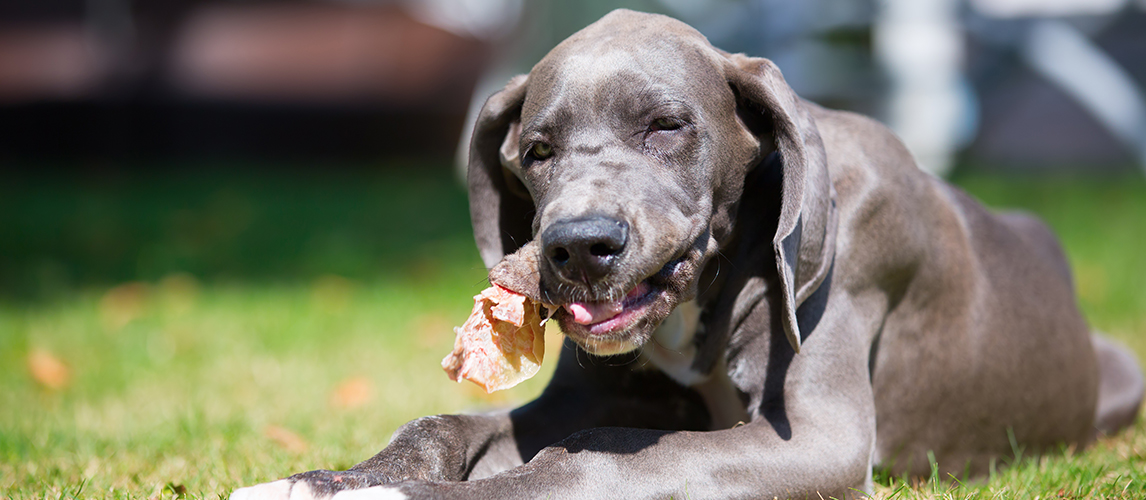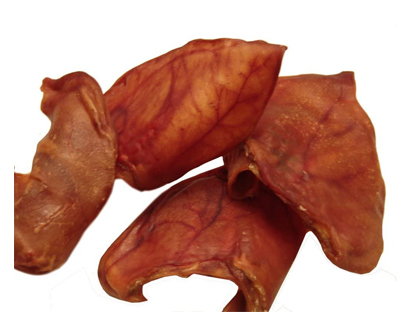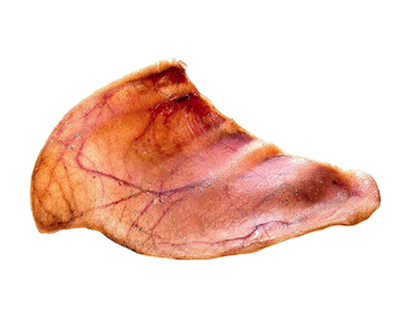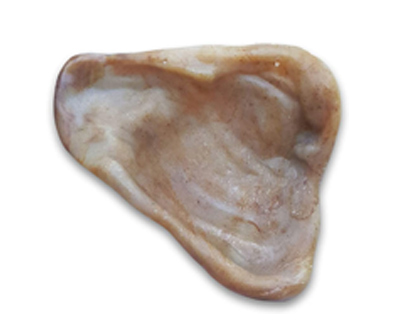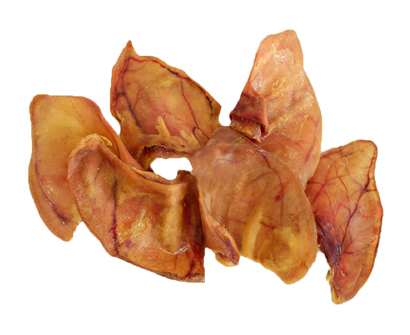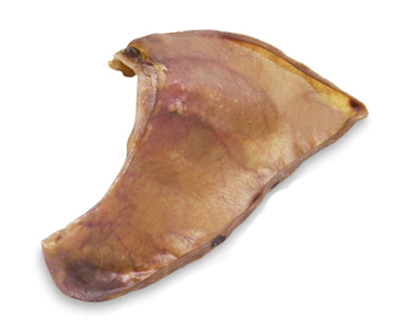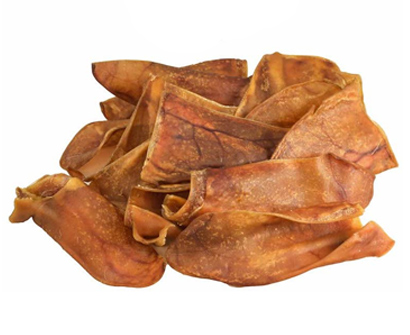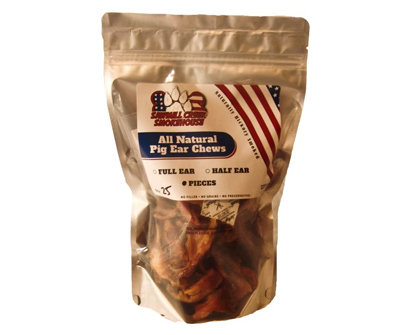- The Best Pig Ear For Dog
- 1. Sawmill Creek Smokehouse Pig Ears for Dogs
- 2. 123 Treats Mix Pig Ears Dog Chews
- 3. Pet Qwerks Pig Ear for Dogs
- 4. Nature Gnaws Large Whole Pig Ears for Dogs
- 5. Best Pet Supplies Whole Pig Ears for Dogs
- 6. Sawmill Creek Smokehouse Pig Ears for Dogs
- 7. Sawmill Creek Smokehouse Pig Ear for Dogs
Finding healthy and nutritious snacks for your dog can be tricky, especially if they are picky eaters or have intolerances. It can be even more difficult to find a lasting tasty treat if you have a dog that seems to inhale rather than chew their treats. One answer to all these issues is pig ears. These chewy treats last for ages and the best ears for dogs are completely natural, so you know that you are giving your dog the very best in taste and care. But, how do you know which pig ears are the best? What should you look for? And, just as importantly, what should you avoid? To point you in the right direction our panel of dog lovers and pet experts have compiled a list of the best pig ears for dogs.
The Best Pig Ear For Dog
1. Sawmill Creek Smokehouse Pig Ears for Dogs
Key Features
Crude Protein min: 22%
Crude fat min: 17%
Crude fiber max: 1%
Moisture max: 12%
Ingredients: 100% natural pig ear
Includes: No additives, fillers, grains, chemicals, or byproducts
Sawhill Creek Smokehouse Pig Ears make the ideal dog treat for even the most aggressive chewer. The hickory-smoked pig ears contain nothing except ears from pigs raised in the USA. The pig ears are carefully smoked and prepared without the use of chemicals or additives. They are free from grains and other fillers and are naturally free from dairy, gluten, and soy. These tasty pig ears will keep your dog happy for hours while you can be confident that they are enjoying treats that contain no byproducts and are made to human food grade standards.
2. 123 Treats Mix Pig Ears Dog Chews
Key Features
Crude Protein min: 59.8%
Crude fat min: 27%
Crude fiber max: 2.4%
Moisture max: 9.8%
Ingredients: 100% pork pig ears
Includes: No coloring, preservatives, or hormones
The Mix Pig Ear Dog Chews from 123 Treats are roasted and made from 100% pork pig ears. The oven-dried dog treats naturally last for a long time and require no artificial preservatives. These tasty ear chews are high in fats and contain amino acids that support coat and skin health. The all-natural tasty dog chews also help prevent dental problems and bad breath by encouraging productive chewing.
3. Pet Qwerks Pig Ear for Dogs
Key Features
100% Pork
Naturally free from grains
Oven-baked for the best flavor
No artificial ingredients or additives
The Large Whole Pig Ears for Dogs from Nature Gnaws are single-ingredient chews that dogs are guaranteed to love. The dog treats are made from high-quality pigs’ ears and contain no artificial ingredients or additives. No chemicals are used in the processing of the ears. Instead, the ears are cleaned with water and then oven-baked to provide a healthy and long-lasting alternative to rawhide dog chews or bully sticks.
4. Nature Gnaws Large Whole Pig Ears for Dogs
The Whole Pig Ears from Best Pet Supplies are slow-roasted to create the perfect balance of flavor, crunch, and chewiness that your dog will love. The 100% natural dog treats are made without the use of hormones, artificial ingredients, additives, or preservatives. The pig ear dog treats are also produced in an FDA certified environment and are inspected for safety by the USDA on arrival in the US.
5. Best Pet Supplies Whole Pig Ears for Dogs
Key Features
Crude Protein min: 22%
Crude Fat min: 17%
Crude fiber max: 1%
Moisture max: 12%
Ingredients: 100% pig ears
Includes: No fillers, grains, byproducts, additives, or chemicals
If you are looking for a tasty treat for your dog, then the Pig Ear Half Chews by Sawmill Creek Smokehouse might be just what you are looking for. The slow-cooked pig ears are cut in half, making them perfect for small dogs or for dog owners looking to limit their pet’s treat and snack intake. The pig ear treats are hickory smoked for the perfect flavor and are sourced and made in the USA. The chew treats are ideal for dogs with allergies or intolerances as they are naturally free from gluten, soy, and dairy. The single-ingredient ear chews for dogs are also free from chemicals, additives, preservatives, and brines, making them a healthy alternative to many other types of chews and bully sticks.
6. Sawmill Creek Smokehouse Pig Ears for Dogs
Key Features
Crude Protein min: 22%
Crude Fat min: 17%
Crude fiber max: 1%
Moisture max: 12%
Ingredients: 100% pig ears
Includes: No fillers, grains, byproducts, additives, or chemicals
If you have a smaller dog breed and worry that a pig ear dog treat might be too much for your pet pooch to handle, then try the Pig Ear Pieces by Sawmill Creek Smokehouse. The pieces contain the same nutritional breakdown as their full ear counterparts but are smaller and more manageable for dogs with little jaws and teeth. The chew pieces are made from 100% natural pig ears and are slow-cooked with hickory smoke for taste. The ear chews contain no artificial ingredients and are finished without additives or preservatives.
7. Sawmill Creek Smokehouse Pig Ear for Dogs
Key Features
Oven baked
Large Pig Ears
No additives, coloring, or preservatives
USDA and FDA Approved
If you have a smaller dog breed and worry that a pig ear dog treat might be too much for your pet pooch to handle, then try the Pig Ear Pieces by Sawmill Creek Smokehouse. The pieces contain the same nutritional breakdown as their full ear counterparts but are smaller and more manageable for dogs with little jaws and teeth. The chew pieces are made from 100% natural pig ears and are slow-cooked with hickory smoke for taste. The ear chews contain no artificial ingredients and are finished without additives or preservatives.
Best Pig Ears For Dogs Buying Guide & FAQ
There is a wide range of tasty chews and treats for dogs and puppies. You can buy dog bones, rawhide treats, bully sticks composite treats, pig hooves for dogs, and raw dog treats. Given the number of different types of treats for dogs, why should you choose pig ears for your pet pooch? As well as providing lasting chewing fun, the best pig ears clean your dog’s teeth and provide healthy fats and proteins that support skin and coat health. Of course, as with all dog treats, they should be fed in moderation as part of a balanced diet. It is also important to choose high-quality pig ears. In this part of the buying guide, we explore some of the key elements that you should consider when buying pig ears for your dog. We also consider just how healthy pig ears are and whether they are better for your dog than rawhide dog chews. Finally, we answer some of the most frequently asked questions about pig ears for dogs including whether providing pig ears for puppies is a good idea.
What to Look for When Buying Pig Ears for Dogs
Carefully produced pig ears provide your dog with a tasty and nutritious chew treat. However, not all pig ears are selected or produced to the same standard. The best pig ears for dogs are thoroughly cleaned and blanched to remove impurities and excess hair. They are then dried slowly at low temperatures to remove any excess water. This can be achieved in an oven or smoker. Where a smoker is used, additional flavor is added naturally to the pig ears.
When buying pig ears for dogs it is vital that you check the labeling carefully. It should provide you with the preserving method and a list of ingredients at the very least. You are looking for pig ears that contain very little or no added ingredients. There should be no artificial additives or chemicals used in the cleaning or drying process. The best pig ears should also be free from allergens such as dairy, soy, and gluten as these are not part of the sourcing, cleaning, or drying process.
Look for pig ears that provide a country of origin. The best and safest pig ears come from places that have high animal care standards. The very best come from free-range pigs that have been fed a natural, chemical and hormone-free diet.
Another thing to look for is FDA certification. This means that the pig ears have been processed to human food standards. For those sourced or processed outside the USA, also look for USDA approval. This means that the pig ears have been inspected on arrival in the USA to ensure that they meet safety standards.

Are Pig Ears Bad for Dogs?
Pig ears are not bad for dogs when carefully sourced and fed as a dog treat as part of a balanced diet. Pig ears can be a carrier for some harmful bacteria, such as salmonella, which is why the sourcing and processing of the ears to a high standard is essential. Pig ear dog treats should not be given to young puppies as the fat content can cause diarrhea and vomiting. The tough dog treat chew can also potentially cause problems for the teeth and jaws of young dogs.
Overfeeding your dog any dog treat can lead to obesity and pig ears are no different. Dogs need their diet to contain around 20% fat. Pig ears have a high-fat content and this needs to be balanced against your dog's main diet to ensure a healthy weight. Overfeeding pig ears can lead to weight-related illnesses such as liver failure, diabetes, and osteoarthritis. Ingesting large amounts of fat can also lead to pancreatitis. As with all dog chew treats, moderation is key. Pig ears are also high in protein and contain essential amino acids that your dog needs to grow and sustain healthy muscle. They also support your dog’s immune system and other basic functions. However, overfeeding pig ears in your dog’s diet can negatively affect the balance of protein, carbohydrates, and fiber that your dog needs.
Feeding the best pig ears to your dog in moderation can help with dental hygiene. The ears are tough and require your dog to gnaw and chew to break them up. The chewing action helps to break down plaque and tartar, reducing the risk of gum disease in dogs.
Dogs should always be supervised when eating pig ears. If large pieces are broken off and swallowed, they can cause obstructions in your dog’s digestive system. Small blockages may cause your dog distress, vomiting, and pain. However, larger blockages may cause perforations of the gut, which can be extremely serious.
Related Post: Vegan Dog Treats
Pig Ears vs Rawhide
Rawhide chews are a popular choice among dogs and dog owners. Dog parents love them because they are generally long-lasting and satisfy their dog’s need to chew. Chewing rawhide enables your dog to relieve their boredom, exercise their jaws, and supports good dental hygiene. This means that they provide many of the same benefits as pig ears without the calorific issues. However, there are numerous issues with rawhide that need to be considered. Rawhide dog chews can cause many of the same issues as pig ears if large parts are broken off and swallowed. This includes choking and blockages.
Pig ears have some nutritional benefits, providing your dog with much needed amino acids and fats, these are not present in rawhide dog chews. Adding pig ears to your dog’s diet as a treat enables you to add proteins and fats but it also means that you need to ensure their diet remains balanced. Neither type of dog treat should be used as a substitute for proper nutritionally balanced meals.
Two of the main concerns over the use of rawhide dog chews is the risk of contamination and the use of chemicals in the product of the chews. There have been numerous reports in recent years of dogs becoming critically ill, sometimes fatally ill, after consuming rawhide dog chews. The best quality pig ears are processed using a washing and oven or smoker drying system. Nothing, except the smoke flavor, is added to the ears during this process. Rawhide dog chew processing requires many more stages. The hair is removed from the hide, often using a chemical process. The lower level of the hide is then set aside for further processing, it may be treated with preservatives or frozen at this stage. Once it reaches the plant where it is turned into dog chews of various shapes, it is often treated with antibacterial wash or bleach before being cut, formed, and dried.
The process of creating rawhide dog chews possess a greater risk to health to dogs than pig ears. However, this only remains true where the best pig ears are carefully selected and processed to a high standard.
Related Post: Rawhide For Dogs
Our Top Pick
Our top pick for dogs is the Sawhill Creek Smokehouse Pig Ears. These incredible pig ears make the ideal dog treat for even the most aggressive chewer. The hickory-smoked pig ears contain nothing except ears from pigs raised in the USA. The pig ears are carefully smoked and prepared without the use of chemicals or additives. They are free from grains and other fillers and are naturally free from dairy, gluten, and soy. These tasty pig ears will keep your dog happy for hours while you can be confident that they are enjoying treats that contain no byproducts and are made to human food grade standards.
Related Post: Bones for Dogs

FAQ
Q: What is a pig ear?
A pig ear is a chewy dog treat that is made by baking or smoking the ear of a pig. The best pig ears are made wholly from this part of the pig. The hair is usually removed first before the pig ears are washed in water and either oven-baked or smoked. The baking or smoking process removes moisture from the ears ensuring that they are naturally preserved and providing a crunchy external texture. During the drying process flavor can be added to the best pig ears by using different wood chips.
Q: Are pig ears safe for puppies?
Puppies, especially very young ones, should not be given pig ears. The high fat content can cause stomach upsets in young dogs. This can lead to anything from mild diarrhea and discomfort to vomiting. Small puppies may also not have the jaw and tooth strength needed to break the pig ear down into manageable chunks. This could result in the pieces becoming a choking hazard or your puppy breaking their teeth. Once you do introduce pig ears to your young dogs' diets, they should not be left along with them and the ears should form a part of a nutritionally balanced and varied diet.
Q: How many pig ears should I feed my puppy?
Young puppies should not be given pig ears as they pose a risk to their health and wellbeing. Once your puppy is old enough to manage pig ears, then you should ensure they are only fed as treats. Even the best pig ears are high in fat and protein and can cause weight gain and health issues if dogs are overfed them. It is recommended that one pig ear a week is enough for a medium-size dog. If you have a smaller dog, consider buying half ears or pieces to ensure you can better monitor their intake. If you are unsure, then speak to your local veterinarian who will be able to offer advice based on the specific needs of your dog.

